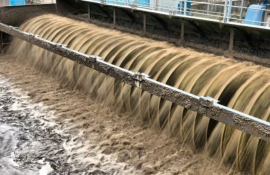
The Department of Water and Sanitation has committed to consider all relevant stakeholders’ inputs when developing the National Faecal Sludge Management Strategy.
The National Faecal Sludge Strategy responds to the United Nations Sustainable Development Goal (NSG) target 6.2 on Sanitation and Hygiene, which states that “by 2030, achieve access to adequate and equitable sanitation and hygiene for all and end open defecation, paying special attention to the needs of women and girls and those in vulnerable situations”.
Through the National Faecal Sludge Management Strategy, the department envisage to guide water and sanitation sector on the safe management of faecal sludge from non-sewered sanitation systems to prevent groundwater contamination, safeguard public health and protect environment from pollution throughout the sanitation value chain.
As part of the quest for dignified sanitation in communities, the department on Tuesday hosted a workshop on the strategy at George in Garden Route, Western Cape.
Department spokesperson, Sputnik Ratau, said the Western Cape workshop is part of a string of workshops held throughout the country to gather input from various sectors, in line with SDG goal/target 6.2.
“Providing, improving, and maintaining satisfactory sanitation affects all members of society, regardless of their economic status,” Ratau said.
During workshop, the department presented a draft National Faecal Sludge Strategy, which advocates some of the strategic propositions.
The strategic propositions includes a well designed and built onsite sanitation technologies which are safe and hygienic, and appropriate to the local context; and that green drop regulatory framework must be extended to faecal sludge, or alternatively develop a different programme to regulate non sewered sanitation systems.
The strategy also propose the promotion of involving local business in the development of technologies for containing, emptying, transportation, treatment, disposal and beneficial use of faecal sludge.
It further proposes that Water Services Authorities (WSA) regulate appropriate onsite sanitation options for households in their areas of jurisdictions, and start planning for areas where faecal sludge should be emptied, transported, treated for safe disposal for beneficial use.
Various stakeholders from the Garden Route welcomed the opportunity to contribute to the National Faecal Sludge Management Strategy.
The stakeholders called for concerted efforts to intensify hygiene and end users’ education about sanitation technologies, to ensure sustainability of sanitation services and that no faecal sludge management solutions should compromise surface and ground water resources.
The stakeholders highlighted a need for the development of financial and economic models, to ensure sustainable and viable sanitation solutions, and urged the department to enforce the principle of polluter pays.
During a workshop, the participants confirmed that there are potential economic opportunities in the entire sanitation value chain, especially if private sector and community-based partnerships are encouraged.
Ratau expressed appreciation for comments submitted on the draft National Faecal Sludge Strategy.
Comments on the strategy close on 10 March 2022. Inputs for the Western Cape Province can be directed to Mchumane Hlazo on HlazoM@dws.gov.za – SAnews.gov.za


